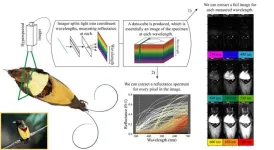Short-term cognitive boost from exercise may last for 24 hours
The short-term boost our brains get after we do exercise persists throughout the following day, suggests a new study led by UCL (University College London) researchers.
Previous research in a laboratory setting has shown that people’s cognitive performance improves in the hours after exercise, but how long this benefit lasts is unknown.
The new study, published in the International Journal of Behavioral Nutrition and Physical Activity, found that, on average, people aged 50 to 83 who did more moderate to vigorous physical activity than usual on a given day did better in memory tests the day after.
Less time spent sitting and six hours or more of sleep were also linked to better scores in memory tests the next day.
More deep (slow-wave*) sleep also contributed to memory function, and the research team found this accounted for a small portion of the link between exercise and better next-day memory.
The research team looked at data from 76 men and women who wore activity trackers for eight days and took cognitive tests each day.
Lead author Dr Mikaela Bloomberg (UCL Institute of Epidemiology & Health Care) said: “Our findings suggest that the short-term memory benefits of physical activity may last longer than previously thought, possibly to the next day instead of just the few hours after exercise. Getting more sleep, particularly deep sleep, seems to add to this memory improvement.
“Moderate or vigorous activity means anything that gets your heart rate up – this could be brisk walking, dancing or walking up a few flights of stairs. It doesn’t have to be structured exercise.
“This was a small study and so it needs to be replicated with a larger sample of participants before we can be certain about the results.”
In the short term, exercise increases blood flow to the brain and stimulates the release of neurotransmitters such as norepinephrine and dopamine which help a range of cognitive functions.
These neurochemical changes are understood to last up to a few hours after exercise. However, the researchers noted that other brain states linked to exercise were more long-lasting. For instance, evidence suggests exercise can enhance mood for up to 24 hours.
A previous study, published by a separate research team in 2016, also found more synchronised activity in the hippocampus (a marker of increased hippocampal function, which facilitates memory function) for 48 hours after high-intensity interval training (HIIT) cycling.
Co-author Professor Andrew Steptoe (UCL Institute of Epidemiology & Health Care) said: “Among older adults, maintaining cognitive function is important for good quality of life, wellbeing, and independence. It’s therefore helpful to identify factors that can affect cognitive health on a day-to-day basis.
“This study provides evidence that the immediate cognitive benefits of exercise may last longer than we thought. It also suggests good sleep quality separately contributes to cognitive performance.
“However, we can’t establish from this study whether these short-term boosts to cognitive performance contribute to longer term cognitive health and though there is plenty of evidence to suggest physical activity might slow cognitive decline and reduce dementia risk, it’s still a matter of some debate.”
For the new study, the researchers looked at data from wrist-worn activity trackers to determine how much time participants spent being sedentary, doing light physical activity, and doing moderate or vigorous physical activity. They also quantified sleep duration and time spent in lighter (rapid eye movement, or REM) sleep and deeper, slow-wave sleep.
In looking at the links between different types of activity and next-day cognitive performance, the research team adjusted for a wide variety of factors that might have distorted the results, including the amount of moderate or vigorous physical activity that participants did on the day of the tests.
They also accounted for participants’ average levels of activity and sleep quality across the eight days they were tracked, as participants who are habitually more active and typically have higher-quality sleep perform better in cognitive tests.
The team found that more moderate or vigorous physical activity compared to a person’s average was linked to better working memory and episodic memory (memory of events) the next day. More sleep overall was linked to improved episodic and working memory and psychomotor speed (a measure of how quickly a person detects and responds to the environment). More slow-wave sleep was linked to better episodic memory.
Conversely, more time spent being sedentary than usual was linked to worse working memory the next day.
The study is among the first to evaluate next-day cognitive performance using a “micro-longitudinal” study design where participants were tracked going about their normal lives rather than having to stay in a lab.
Among the study limitations, the researchers noted that the participants were a cognitively healthy group, meaning the results might not be true for people who have neurocognitive disorders.
The study involved researchers from the UCL Institute of Epidemiology & Health Care, UCL Division of Surgery & Interventional Science and the University of Oxford, and received funding from the UK’s Economic and Social Research Council (ESRC).
*Slow-wave sleep was given its name based on the characteristic brain waves that can be observed during this stage of sleep. It is deep, restorative sleep, where a person’s heart rate slows and blood pressure decreases.
END
Short-term cognitive boost from exercise may last for 24 hours
2024-12-10
(Press-News.org)
ELSE PRESS RELEASES FROM THIS DATE:
Pulte Institute joins global consortium using research to end poverty
2024-12-09
The United States Agency for International Development (USAID) has awarded $75 million to a consortium of leading global institutions, including the Pulte Institute for Global Development at the University of Notre Dame’s Keough School of Global Affairs, to enhance the effectiveness of poverty alleviation programs through research.
The Promoting Impact and Learning with Cost-Effectiveness Evidence (PILCEE) partnership, led by the Center for Effective Global Action at the University of California, Berkeley, represents a historic ...
ASH: Monoclonal antibody therapy improves survival in cancer-associated hyper-inflammatory disorder
2024-12-09
ABSTRACT: 805
SAN DIEGO – Adult patients with newly diagnosed malignancy-associated hemophagocytic lymphohistiocytosis (mHLH) – a rare, aggressive hyperinflammatory condition – who were treated with the first-in-class monoclonal antibody, ELA026, experienced a 100% response rate and an improved survival rate at two months, according to researchers from The University of Texas MD Anderson Cancer Center.
Data from the Phase Ib trial were presented today at the 66th American Society of Hematology (ASH) Annual Meeting and Exposition by Abhishek Maiti, M.D., assistant professor of Leukemia and the trial’s principal investigator. ...
Researchers ‘see’ vulnerability to gaming addiction in the adolescent brain
2024-12-09
Playing video games is a rite of passage for many adolescents, but for some, it could also be the first step to a gaming addiction.
“A number one concern for parents of children and teenagers is how much screen time and how much gaming is enough gaming and how to figure out where to draw the line,” said John Foxe, PhD, director of the Del Monte Institute for Neuroscience at the University of Rochester and co-author of a study out today in the Journal of Behavioral Addictions that discovered a key marker in the brain of teens who develop gaming addiction symptoms. “These data begin to give us some answers.”
Researchers ...
Considering social and genetic factors in addition to clinical factors improves prediction of heart disease risk
2024-12-09
Embargoed for release until 5:00 p.m. ET on Monday 9 December 2024
@Annalsofim
Below please find summaries of new articles that will be published in the next issue of Annals of Internal Medicine. The summaries are not intended to substitute for the full articles as a source of information. This information is under strict embargo and by taking it into possession, media representatives are committing to the terms of the embargo not only on their own behalf, but also on behalf of the organization they represent.
----------------------------
1. ...
Biomarker-guided antibiotic duration for hospitalized patients with suspected sepsis
2024-12-09
To access the embargoed study: Visit our For The Media website at this link https://media.jamanetwork.com/About The Study: In hospitalized adults, daily procalcitonin -guided protocol reduced antibiotic duration safely compared with standard care, but daily C-reactive protein -guided protocol does not. All-cause mortality for C-reactive protein was inconclusive.
Corresponding Author: To contact the corresponding author, Paul Dark, MD, PhD, email adaptsepsistrial@warwick.ac.uk.
To access the embargoed study: Visit our For The Media website at this link https://media.jamanetwork.com/
(doi:10.1001/jama.2024.26458)
Editor’s ...
American Meteorological Society announces Alan Sealls as 2025 President-Elect
2024-12-09
Members of the American Meteorological Society (AMS) have elected Alan Sealls to the position of AMS president-elect for 2025. Sealls is an AMS Fellow and Certified Broadcast Meteorologist who retired this year from a 37-year broadcast career, which included serving as chief meteorologist at WPMI-TV in Mobile, Alabama. He will be inducted as president-elect on Sunday, 12 January, 2025, during the 105th AMS Annual Meeting in New Orleans, Louisiana.
At the meeting, the AMS—the professional society for weather, water, and climate sciences ...
Dogs use two-word button combos to communicate
2024-12-09
A new study from UC San Diego’s Comparative Cognition Lab shows that dogs trained to use soundboards to “talk” are capable of making two-word button combinations that go beyond random behavior or simple imitation of their owners. Published in the journal Scientific Reports from Springer Nature, the study analyzed data from 152 dogs over 21 months, capturing more than 260,000 button presses – 195,000 of which were made by the dogs themselves.
“This is the first scientific study to analyze how dogs actually use soundboards,” said lead researcher Federico Rossano, associate professor of cognitive science at UC San Diego and director ...
Researchers use a powerful imaging technique to illuminate the colorful plumage of birds
2024-12-09
Animals showcase a remarkable diversity of colors and patterns, from the shimmery appearance of a peacock’s tail to the distinctive rosettes on a jaguar’s fur. Quantifying animal color has been a longtime goal of evolutionary biologists, who aim to understand how color evolved over time—and the physical and genetic mechanisms involved. Ultimately, studying animal color is important because it can reveal how evolutionary forces, such as natural and sexual selection, favor certain traits over others. However, fully capturing animal color is challenging because researchers must choose between high spatial resolution (as in traditional ...
Jabuticaba peel improves nutritional characteristics of bread
2024-12-09
Researchers at the State University of Campinas (UNICAMP) in São Paulo state, Brazil, have developed a sourdough bread formulation enriched with jabuticaba peel that could be an alternative for people with diabetes and others who need to control blood sugar. An article describing their research and test results is published in the journal Foods.
As noted in the article, the high carbohydrate content of bread can sharply raise blood sugar levels, risking hyperglycemia. Given the high demand for healthier bread, which is widely consumed, artisanal bakers seek to diversify their products with formulations that add nutritional value while involving fermentation ...
Department of Energy announces $36 million for student traineeships
2024-12-09
WASHINGTON, D.C. - Today, the U.S. Department of Energy (DOE) announced 29 projects totaling $36 million to 42 institutions in 16 states for traineeships for undergraduate students, graduate students, and postdoctoral researchers in science, technology, engineering, and mathematics (STEM). The funding, through the DOE Office of Science’s RENEW initiative, will support hands-on research experience, professional development activities to build or reinforce STEM identity, and mentorship to support personal and professional growth of trainees.
“The RENEW program provides new entry points to science for ...


